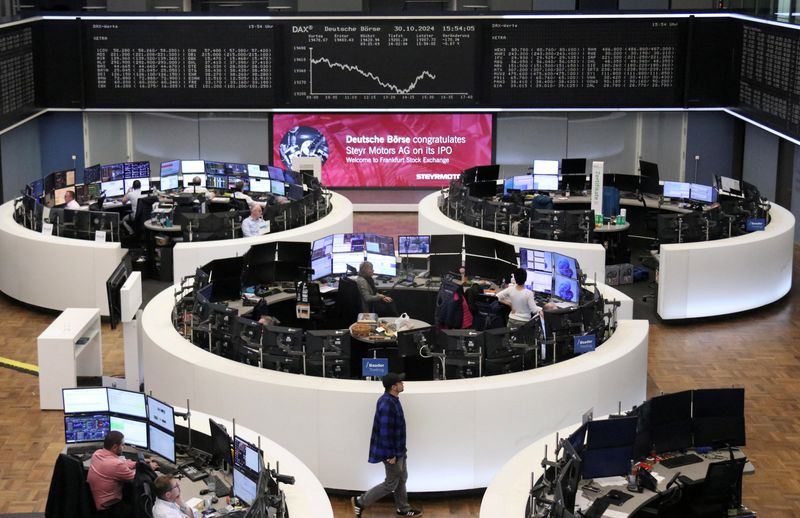[ad_1]
By Lucy Raitano and Samuel Indyk
LONDON (Reuters) – Europe’s third-quarter earnings have mostly topped markets’ low expectations and investors are rewarding beats more handsomely than they have in years, even though weak China demand is a cause for caution.
In the two months prior to the start of Europe’s earnings season, analysts cut their estimates for earnings growth by around 380 basis points, data from LSEG I/B/E/S showed, giving a lower bar for companies to beat expectations.
Analysts often trim their growth forecasts just before earnings season kicks off, but usually by only about 100 bps.
So far this season, with around 50% of the having reported results, some 56% of companies have beaten expectations, according to Citi equity strategists, broadly in line with an average quarter.
As the U.S. heads to the polls on Tuesday, uncertainty stemming from the election might keep trading in European shares volatile for some time.
We look at five lessons from Europe’s Q3 earnings season so far.
EARNINGS BEATS REWARDED
In a reversal from previous quarters, companies beating expectations have largely been rewarded by investors more than those that have missed forecast have been punished.
Analysis by Bank of America Global Research found stocks beating expectations beat the market by 1.8% on average on the day they announced earnings, the second strongest in a decade, while companies missing EPS underperformed by 0.8%, largely in line with historical averages.
“Concerns on Q3 earnings in Europe had been ramped up ahead of Q3 reporting,” said BofA equity strategist Andreas Bruckner.
“These concerns appear to have been overblown, with earnings recording a nice positive surprise, which also shows in: companies beating on EPS being nicely rewarded with outperformance; and consensus EPS for Q3 being revised up by 3% in recent weeks.”
CHINA WEAKNESS HITS CYCLICALS
Despite beats being largely rewarded, the impact of China’s flagging economy has reverberated among Europe’s cyclical stocks, with warnings of lower demand from the world’s second largest economy cutting across sectors.
“The earnings trends we are currently seeing are negative everywhere, there are sizeable earnings revisions and the breadth series has fallen across all regions, but it’s far worse in Europe than elsewhere, some of that has been in Chinese-related sectors like autos,” said Graham Secker, head of equity strategy at Pictet Wealth Management.
Luxury bellwether LVMH, automakers Mercedes-Benz (OTC:) and Volkswagen (ETR:) and energy company BP (NYSE:) all warned China’s sluggish activity was impacting results.
CHINA STIMULUS OFFERS GLIMMER OF HOPE
Despite the doom and gloom – and very real impact on Q3 figures – there remains some optimism for a recovery in China demand given the aggressive stimulus measures announced in September by Chinese authorities to bolster its economy, as well as the potential of more to come.
Bernie Ahkong, CIO Global Multi-Strategy Alpha at hedge fund UBS O’Connor, said that it is not a huge surprise that companies are still downbeat about near-term demand from China, but added European stocks are reacting much more positively on earnings relative to actual financials and outlook.
“…investors are looking through this somewhat given stimulus measures, and we are also seeing short covering and de-risking from hedge funds into U.S. elections,” said Ahkong.
Other investors, meanwhile, said they want hard evidence that Chinese stimulus is trickling through to the real economy and company balance sheets.
BANKS RIDING INTEREST RATE WAVE
Europe’s banks had another positive quarter, as still high interest rates supported margins.
The European Central Bank is set to further lower borrowing costs, yet investors remain optimistic.
“Interest rates will be structurally higher than what they were in previous cycles,” said Thomas McGarrity, director, head of equities at RBC Wealth Management.
“That’s very helpful for banks. We’re not going back,” McGarrity added.
Data from LSEG I/B/E/S estimates earnings growth for financials of 20.6% in the third quarter, the third-highest growth rate among Europe’s major sectors behind utilities and basic materials.
So far, their data shows 80% of companies in the sector have beaten earnings expectations.
WEAK GROWTH OUTLOOK PROVIDES SMALL OPPORTUNITIES
Europe’s economy has stagnated for most of the last two years, hampered by the dominant industrial sector suffering from surging energy costs and soft global demand.
Many of Europe’s larger companies have a global footprint, but weak domestic demand is weighing on earnings for small- and mid-caps and the outlook remains fragile.
“We’ve had this downgrade of expectations among companies and the outlook is now saying the recovery is going to happen in 2025,” said Marlborough fund manager David Walton, whose strategy focuses on smaller companies.

“We’re in a situation where it’s unclear whether there will be a meaningful recovery in growth in 2025, but that creates an opportunity because we’re able to buy companies at low valuations.”
European companies remain historically cheap, trading at 13.6x 12-month forward earnings versus the long-term average of 14.3x. Mid-caps are even cheaper, trading at 12-month forward P/E of 12.7x versus a long-term average of 15x.
[ad_2]
Source link
